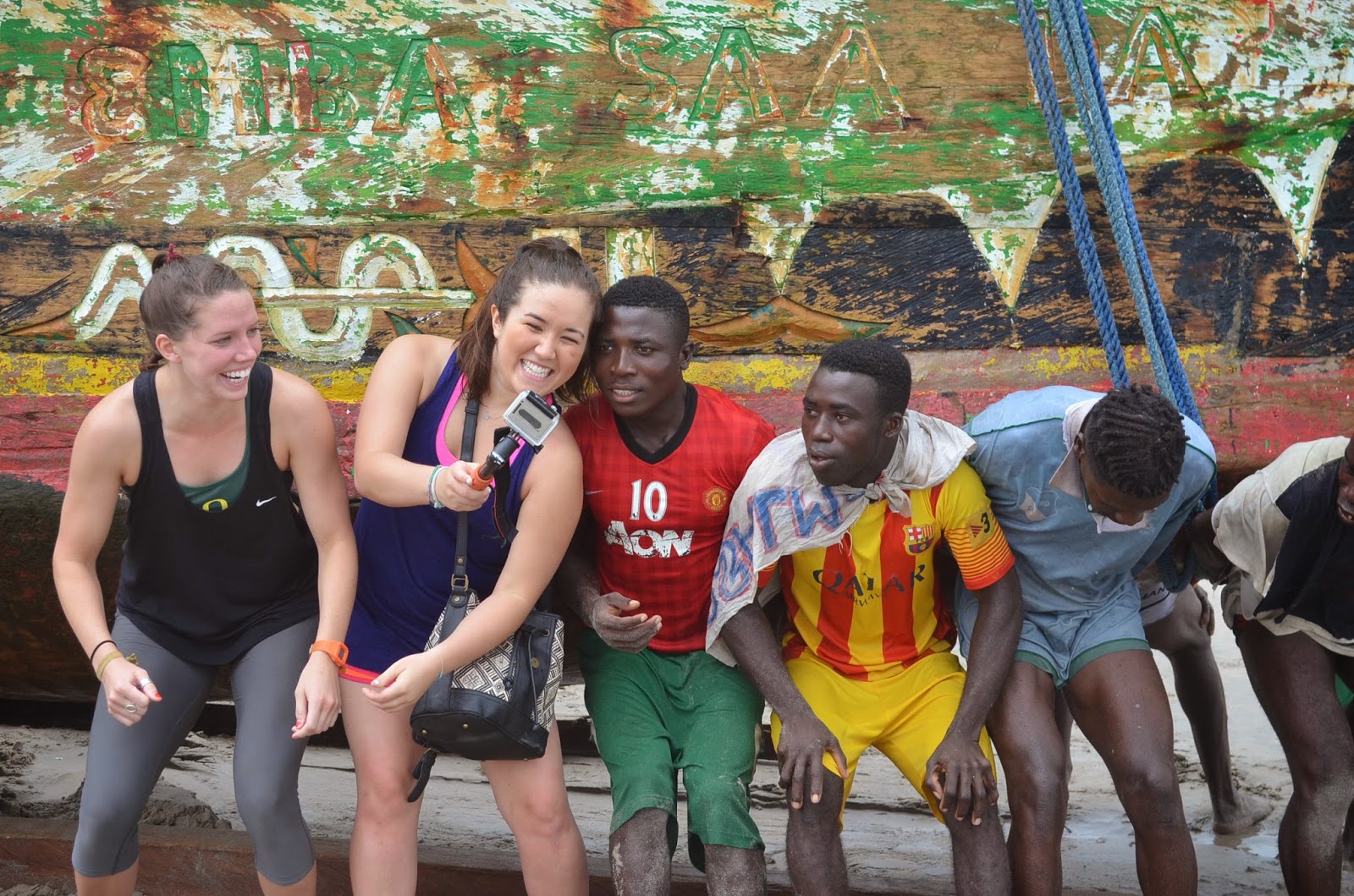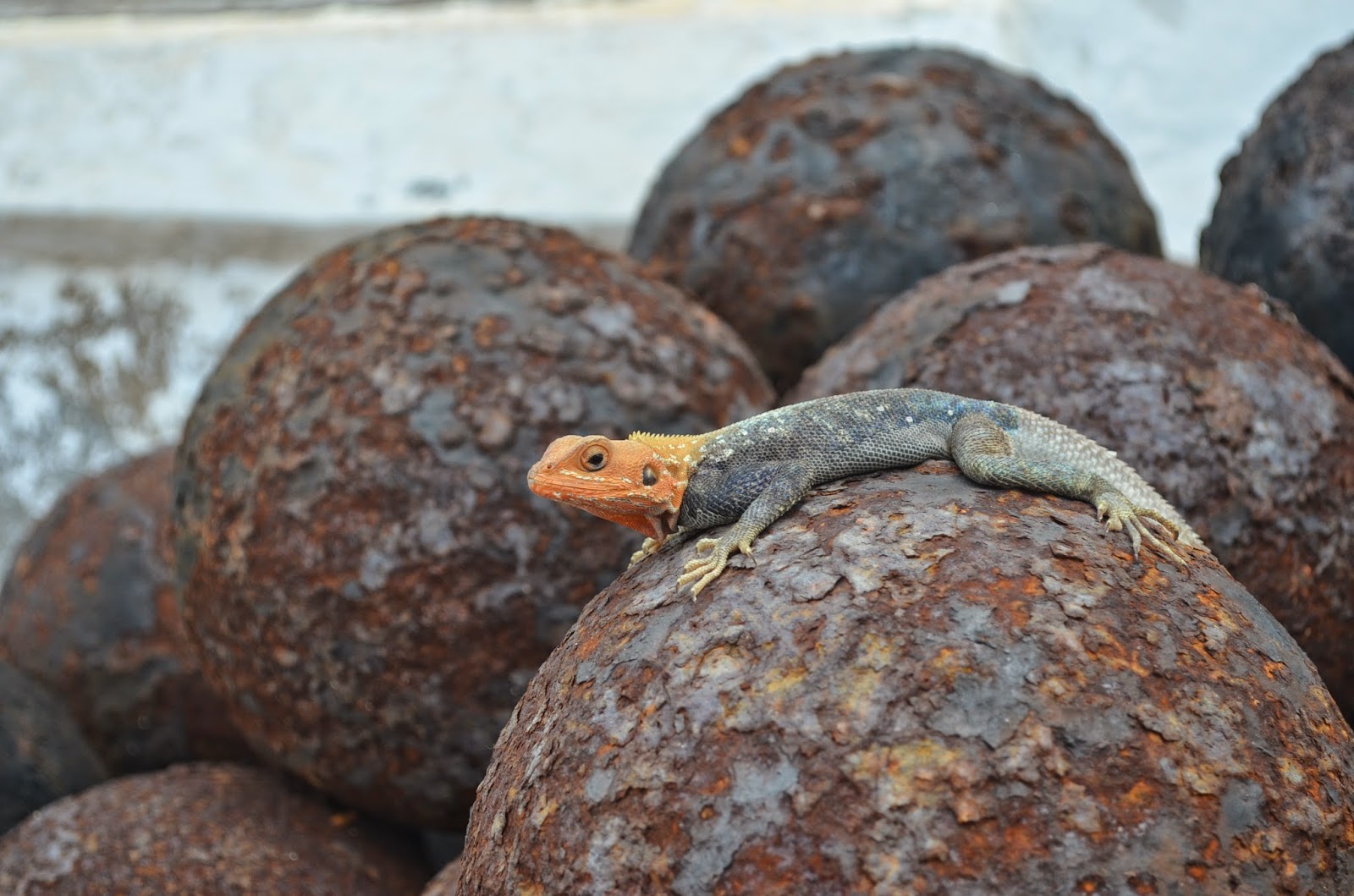Here is the unedited version of my article on my experiences in Ghana (I'm not retyping the whole thing just to include the changes my editor made, sorry).
"I am a daughter, an older sister and a soon-to-be wife, a
student, a journalist, a mentor. I am a cat lover, a sports fan, and as of last
week, I am an obroni.
Before I can talk about my first week in Ghana, though, it
is important for me to explain where I’m from. I grew up in New York in the
United States with my mother, father, and two younger siblings. We lived in an
upper middle class neighborhood. My father worked and my mother stayed at home
to take care of us until we were all in school, then she worked in a school as
a primary school teacher. When I was 14, my father decided to start his own
business so we moved across the country to the beautiful state of Oregon, where
I now attend college at the University of Oregon as a journalism major.
Already I have seen much in Ghana that is very different
than how I grew up and where I live now. The thing about Ghanaians that I am
most impressed with is their kindness. When one of my friends and I got sick
one of my first days here, our bus driver drove us to the pharmacy, made sure
we had everything we needed, then walked us across the street and helped us buy
bananas before taking us home. He went out of his way to help us without
expecting anything in return, and I was very surprised and grateful for that.
Again at Reggae Night at Labadi Beach our group was welcomed
with so much kindness and openness that would not have happened where I’m from.
We were invited to dance and made a part of the fun even though it was clear
that we outsiders. My community at home is known for being very close and
friendly, but it doesn’t compare to what I’ve experienced in Ghana from
complete strangers. When you’re walking down the street at home, it is not
uncommon to make your journey without talking to a single person. It is almost
overwhelming here the about of attention I receive here but at least so far it
has all been smiles and waves and polite hello’s.
When someone in the United States is different, it often
means that they are excluded. It seems to be the opposite here. When my
housemates and I went to Cape Coast the past weekend, we visited El Mina Castle
and four of us decided to walk onto the beach to check out the fishing boats.
For a few minutes, we watched a group of men work to pull a huge wooden boat onto
the shore until the men at the end of the boat beckoned us over. They told us
to join in so my friends lined up along the side of the boat with the Ghanaians
and lifted the boats with their backs, everyone laughing the whole time, while
I took photos. I tried helping to pull the ropes at the other end of the boat
after that, although I’m not very big so I don’t think I was much help at all.
I never would have expected to be so openly accepted by them and I’m glad I got
the opportunity to be a part of their day.
We were told before we got to Ghana that some people would
try to befriend us because we are obronis and we have money, but that has only
happened a few times. Overwhelmingly, the kindness we have been shown has been
genuine and we have met some really good people during our stay so far.
One of the things that has been hardest for me to get used
to here is the idea of bargaining because in the United States, whatever price
the seller gives you is the price you pay. There are a few markets where bargaining
is acceptable, but even in those places most people don’t bargain because it’s
uncomfortable for us. At first I felt rude asking for a lower price when I was
bargaining for my Black Star jersey, as if I was insulting the vendor. I
bargained a little and ended up paying 25 cedis, a price I was happy with
considering I would have probably paid the equivalent of 100 cedis or more in
the United States for the same jersey. My friend thought he got a great deal on
a Ghanaian flag which he bought for 30 cedis until he found our our Ghanaian
bus driver bought the same flag for 15 cedis. I know that I have gotten “ripped
off” more than a few times since I’ve been here which is frustrating because
bargaining is a skill I want to get good at, but I always have in the back of
my mind how much I would have paid in the United States for the same object so
most of the time I don’t mind paying a few extra cedis to make a deal.
It is not hard to understand then, based on what I said
about my attitude on bargaining, why Ghanaians perceive us as wealthy because
we are from the United States. In Ghana, we have a lot of purchasing power
because our dollar goes much farther here than in the United States. For
example, if I was in the United States and I had $5, I would only be able to
buy enough bottles of water for my two siblings and myself, and they would be
only three-fourths of a liter. In Ghana, I would be able to buy twice as many
bottles of water with twice as much water. So when Americans come to Ghana, we
are relatively wealthy compared to those around us, even if we aren’t wealthy
at home.
This is why I find it funny when Ghanaians ask me to take
them back to America with me. When we got there, they would find that I’m not
living in a fancy house, just a small apartment in an old apartment complex. I
don’t have a car and the clothes that I wear are bought on sale from less
expensive stores. I am in debt thousands of dollars because of tuition, which
is about 10,500 dollars a year now, and paying for rent. It makes me laugh when
people think I’m rich because it is only for the short time that I’m here.
Even still, being in Ghana one week has taught me that there
are things I can be happy living without. I miss air conditioning and hot
showers, but those are things I’ve learned to live without like many Ghanaians
do. I thought things would be bad when our house lost electricity and we
couldn’t access the internet, but it ended up being one my favorite nights in
the house because we got to know each other and played games and interacted.
One of my friends even put on a ten minute Michael Jackson routine for us. At
school, it wasn’t uncommon for me to have coffee everyday or even twice a day,
but I haven’t had a cup of coffee since I’ve been in Ghana and I’m fine with it.
The only things I miss badly besides my family are my kitten and the variety of
food in my hometown.
One of our day trips was to Anani Memorial International
School. To get to the school, we had to venture through the streets and
alleyways of Nima where I saw people who have much less than I do at home, but
were happier than I was. At home I am always worried about money, how I will
afford things like my wedding, finding more work, what I need to do to get a
job in the competitive journalism field. I was not happy with where I was in
life and I think that is the case for many Americans. That is not to say I
never had moments of joy, because there were many, or that the people in Nima
never feel pain or sadness, because I’m sure they face hardships just as we all
do. But you could see in their smiles and the way they interacted with each
other that they do not spend their days dwelling on worries and the things they
don’t have and choose instead to enjoy their lives. I think Americans could
learn a lot about being happy from Ghanaians.
I have not been here long so I cannot pretend to
know everything about Ghanaian culture, but I speak from what I have
experienced so far. I very much look forward to learning more about this
beautiful country and the people who live here in my next few weeks in Ghana."







.JPG)












